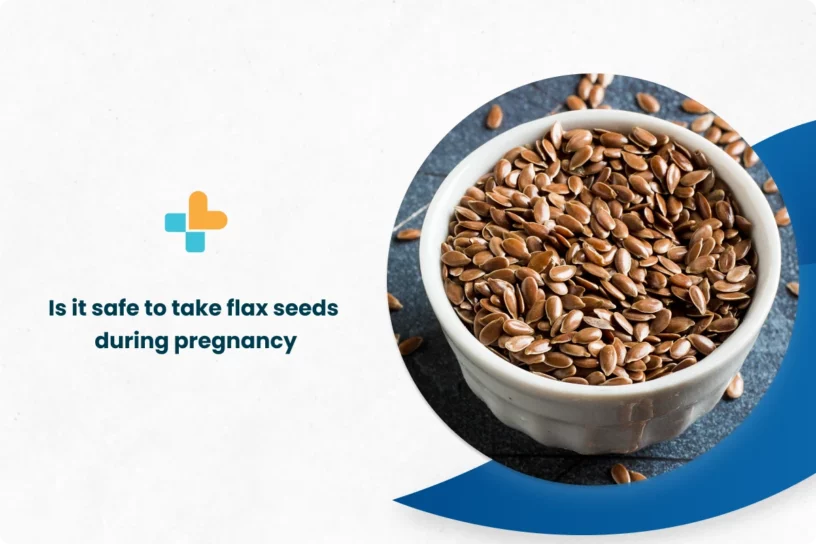Introduction
Flaxseeds and flaxseed oil are known for their many health benefits, including being a rich source of omega-3 fatty acids, antioxidants, and fiber. Pregnant women may wonder if it is safe to consume flaxseeds during pregnancy. This article will explore the safety of consuming flaxseeds during pregnancy, the potential benefits and risks, and how to include flaxseeds in your diet while pregnant.
What are flaxseeds and flaxseed oil?
Flaxseeds are small, brown or golden-colored seeds that come from the flax plant. They can be eaten whole or ground into a powder and are often used as a dietary supplement. Flaxseed oil is made by pressing the seeds to extract the oil and is often used as a cooking oil or dietary supplement.
Is it Safe to Eat Flaxseeds During Pregnancy?
Flaxseeds are generally considered safe to consume during pregnancy when consumed in moderation. However, it is important to note that flaxseeds contain compounds called lignans which can be harmful in large quantities. It is also important to note that flaxseed oil does not contain lignans, but it does not contain all the beneficial components that whole flaxseed does.
Benefits of Consuming Flaxseeds for Pregnant Women
Flaxseeds are a good source of omega-3 fatty acids, which are essential for the growth and development of the baby’s brain and eyes. They also contain antioxidants and fiber, which can help regulate digestion and promote overall health.
Potential Risks and Side Effects of Excess Intake of Flaxseeds in Pregnancy
Consuming large amounts of flaxseeds during pregnancy can increase the risk of bleeding and may also interfere with the absorption of certain nutrients. It is essential to consume flaxseeds in moderation and under the guidance of a healthcare professional.
How to Include Flaxseeds in My Diet?
Flaxseeds can be easily included in your diet by adding them to smoothies, yogurt, oatmeal, or as an ingredient in baking. It’s important to note that it is recommended to consume flaxseed under doctor’s supervision and in moderate quantity, to avoid any potential risk.
How Many Flaxseeds Can I Consume While Pregnant?
It is generally recommended to consume no more than 1-2 tablespoons of ground flaxseeds per day during pregnancy. It is essential to talk to your healthcare professional to determine the right amount for you.
Is it Dangerous to Consume Too Much?
Consuming large amounts of flaxseeds during pregnancy can increase the risk of bleeding and may also interfere with the absorption of certain nutrients. It is essential to consume flaxseeds in moderation and under the guidance of a healthcare professional
Conclusion
Flaxseeds and flaxseed oil are considered safe to consume during pregnancy when consumed in moderation. They offer many potential benefits, including providing omega-3 fatty acids, antioxidants, and fiber. However, it is essential to consume them under the guidance of a healthcare professional to ensure that you do not consume too much and to avoid potential risks. As always, it is important to consult your doctor before making any dietary changes during pregnancy.
Then Ayu Health may be your best bet! For booking an appointment, call 636-610-0800.
FAQs:
- Is it safe to consume flaxseed while pregnant?
Consuming flaxseed while pregnant may be beneficial as it is a good source of omega-3 fatty acids, fiber, and antioxidants. However, it is important to note that flaxseed contains phytoestrogens, which can mimic the effects of estrogen in the body. It is recommended to consume flaxseed in moderate amounts, and to consult with a healthcare professional before consuming it during pregnancy.
2. Are chia and flax seeds safe during pregnancy?
Chia and flax seeds are generally considered safe to consume during pregnancy, but as with any dietary supplement, it is always best to consult with a healthcare professional before consuming them in large amounts. They are also a good source of omega-3 fatty acids, fiber, and antioxidants.
3. Which seeds are good in pregnancy?
Seeds that are considered safe to consume during pregnancy include:
- Flax seeds: They are a good source of omega-3 fatty acids and fiber.
- Chia seeds: They are a good source of omega-3 fatty acids, fiber, and antioxidants.
- Pumpkin seeds: They are a good source of zinc, magnesium, and other important minerals.
- Sunflower seeds: They are a good source of vitamin E, which is important for the development of the baby’s brain.
- Sesame seeds: They are a good source of calcium, which is important for the development of the baby’s bones.
It’s always best to consult with your healthcare professional for personalized advice.
Our Hospital Locations
Gynaecology Surgery Hospitals in Chandigarh | Gynaecology Surgery Hospitals in Bangalore | Gynaecology Surgery Hospitals in Jaipur | Gynaecology Surgery Hospitals in NCR | Gynaecology Surgery Hospitals in Hyderabad
Our Doctors
Gynaecology Surgery Doctors in Chandigarh | Gynaecology Surgery Doctors in Bangalore | Gynaecology Surgery Doctors in Jaipur | Gynaecology Surgery Doctors in NCR | Gynaecology Surgery Doctors in Hyderabad
About the Author

Dr. S. Goel
Dr. S. Goel is a renowned Internal Medicine Specialist currently practicing at Ayu Health, Bangalore. He is a Specialist in Internal Medicine, Diabetes HTN, Paediatric Care, and Family Medicine.




